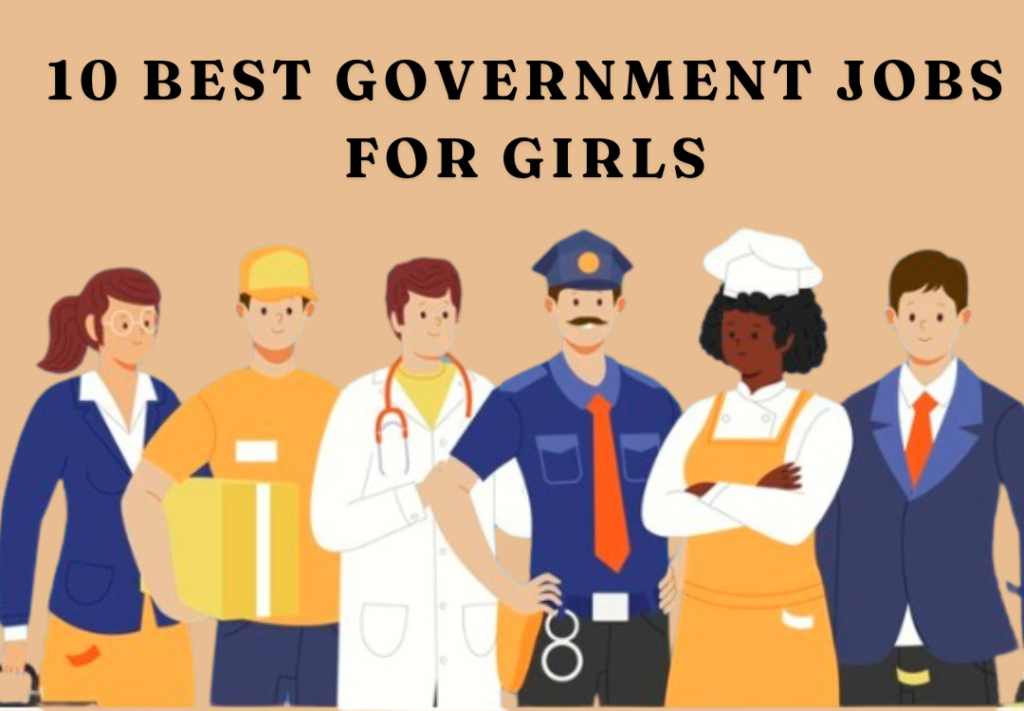Looking for a government jobs after 12th class is an important step for candidates who are looking for a stable and respectable career. There are many opportunities in the public sector for women candidates in India that not only provide job security but also provide additional benefits of working in a government role. Some government job information for the candidates is given below in the block post that which government jobs are reserved for women candidates, stay with us in this block post.
10 best government jobs for girls
Looking for government jobs after 12th class is an important step for those girls. There are many jobs for the candidates by the government like SSC CHSL, Railway Jobs etc. These are the jobs in which women get the opportunity to work. When talk about secure professions for women, government jobs always ring a bell. This is because government jobs tend to be more secure than most other types of jobs thus a lot of females would strive to work in them. In the current high-paced job market with scarce jobs but less skilled people for them, most women are turning to government employment that they believe is both satisfying career-wise and supportive of their individual desires of development.

Table of Contents
Indian Administrative Service (IAS)
Profile: IAS officers participate in framing and implementing policies. They are in charge of administrative matters, law and order in the state, and monitoring the efficient implementation of government schemes.
Promotion: The IAS officers begin with their career as Sub-Divisional Magistrates and after promotion they can become Chief Secretary of a state or Cabinet Secretary of India.
Famous personalities: There are many women IAS officers who have created history, for example, Smita Sabharwal, an IAS officer known as “People’s Officer” for her administrative reforms in Telangana.
Indian Foreign Service (IFS)
Profile: IFS officers represent India in various countries abroad; handle diplomatic communication and work in the arena of international relations.
Growth Prospects: IFS officers start off as Third secretaries and can go on to become Ambassadors representing India in different countries.
Notable personalities: Nirupama Rao is a veteran IFS officer who has served as the Foreign Secretary of India and held the post of India’s Ambassador to Israel, Turkey, Ethiopia, and UNESCO.
Teaching Jobs
Profile: Government schools and colleges invite teachers to impart education, design courses and engage in academic development.
Prospects: There are possibilities of growth and promotion to higher posts such as Principals, Education Officers, Special Secretaries and even Members of Parliament, especially those dealing with issues related to education. One could also get into educational administration, planning and consultancy.
Who have made it big: Dr. Sarvepalli Radhakrishnan, the illustrious former President of India, was a teacher; so were Dr. S. Radhakrishnan, Dr. C. Rajagopalachari, and many others who left us inspirational stories to enter this most noble of professions.
NVS Non-Teaching Recruitment 2024 [1377 Post] Apply Online, Last date (7th May)
Banking Jobs
Profile and Responsibilities: In banks, working women manage cash transactions, customer relations and administrative services in nationalisation banks.
Growth Prospects: Female candidates can achieve the post of Branch Manager, General Manager and even Chairperson in banks, by starting their career as Probationary Officers.
Famous Personalities: Arundhati Bhattacharya, the first woman Chairperson of State Bank of India, is a shining example for working women in the banking sector.
SSC CGL (Staff Selection Commission Combined Graduate Level)
Overview: In government departments group B and group C posts are recruited for by SSC CGL.
Why Consider It?: Some of the posts that students in SSC CGL can get include tax inspectors and auditors and statistical investigators.
How to Get In: Candidates will be required to sit for the SSC CGL exam that has four tiers.
Healthcare Sector
Doctors in Government Hospitals
Role and Responsibilities: They are responsible for treating patients, researching and working in public health programs.
Career Growth: The career growth is excellent from Junior Doctor to Senior Consultant to Head of the Department.
Success Stories: Dr Soumya Swaminathan who is the Chief Scientist of the World Health Organization, is a former government doctor.
Nursing Jobs
Profile & Responsibilities: The nurses in the government hospitals are expected to take care of the patients, assist the doctors and also supervise the healthcare institutions.
Growths factors: The nursing careers are having some of the parallel career growth like Senior Nurse, Nursing Superintendent, Deputy Nursing Superintendent, Assistant Nursing Superintendent, and Chief Nursing Officer, etc.
Famous personalities: There are many famous nurses like Florence Nightingale who established the concepts of modern nursing and showed the importance of a dedicated nurse.
Public Sector Undertakings (PSUs)
Jobs in PSUs
Engineers: Women engineers in PSUs include electrical, mechanical, civil, and computer engineers.
Administrative Posts: Administrative, finance and human resource posts in PSUs can also be held by women.
Growth: Rapid growth is available up to top levels like General Managers and Directors.
Faces: Soma Mondal, Chairperson of Steel Authority of India Limited (SAIL) is a successful woman in PSUs.
Defence Services
Women in Army, Navy, Air Force
Roles and Responsibilities: Defense Services Women in the Army, the Navy, the Air force. Women in the military serve as officers, pilots, engineers, and doctors, among other things, contributing to the country’s security and operations.
Career development: It’s possible for them to climb up the ranks to become Colonels, Brigadiers among other high positions in the navy as well as the air force.
Success stories: Avani Chaturvedi, a Flight Captain, who is one of the first Indian female fighter pilots has become an inspiration for many young girls who want to join the defense.
Railway Jobs

Roles and Responsibilities: As station masters, engineers, and administrative officers women work in Indian Railways.
Career Growth: Move on through the ranks to Divisional Railway Manager and other senior administrative positions.
Success Stories: Surekha Yadav was the first female train driver in Asia, she was able to demonstrate that even in male-dominated areas women could make it.
Judiciary and Legal Services
Roles and Responsibilities: Women are appointed in the judiciary as lawyers, chief magistrates, and litigators.
Career Growth: They can be elevated to the status of the Chief Justice of the High Court or even at Supreme court.
Success stories: For instance Justice M. Fathima Beevi the first female judge in India’s supreme court opened up an opportunity for many women in the judiciary.
Social work and civil services
Roles and responsibilities: Women working in the social work sector combat poverty, illiteracy, and strive for the rights of women, through diverse government offices and NGOs.
Career progression: Aspirations can lead to top management positions in the department of welfare services in state governments and other international bodies. Women like Anu Aga who spent most of their lives doing charity and corporate social responsibilities have a lot to show for it in their lives as far as work is concerned.
Research and Development Scientists in Government Labs
Roles and Responsibilities: Female scientists carry out investigations, innovate on new technologies, and push forward scientific progress.
Career Growth: Within research centres, the position rises from an assistant researcher to directorship.
Success Stories: Dr. Tessy Thomas, dubbed the “Missile Woman of India”, accomplished much in defence research.
Media and Communication
Roles of Women in Government Media Houses Roles and Responsibilities: In government media houses, women function as journalists, editors, and communication specialists.
Career Growth: They can grow into top editorial posts and management level positions within media establishments.
Success Stories: Great strides have been achieved by women such as Nidhi Razdan in government media which set the pace for subsequent journalists.
What are the eligibility criteria for UPSC exams?
Age limit
- Candidates must be at least 21 years old and not more than 32 years old as of 1st August 2024.
- The candidate’s birth date should fall between 2nd August 1991 and 1st August 2002.
- Age relaxations apply based on the category:
- General Category: 32 years (with 6 attempts).
- OBC: 35 years (with 9 attempts).
- SC/ST: 37 years (unlimited attempts up to the age limit).
- Disabled Defence Services Personnel: 35 years (with 9 attempts).
- Ex-Servicemen: 37 years (with 9 attempts).
- Persons with Benchmark Disability (EWS): 42 years (with 9 attempts).
Educational Qualification:
- Candidates must have completed graduation from a recognized university.
- Nationality: Only Indian citizens are eligible.
How can I start preparing for UPSC exams?
Get ready, prepare yourself: Prepare yourself mentally and physically to embark on this journey before embarking on the study material. Understand the UPSC exam pattern, syllabus and three stages: Prelims, Mains and the Interview. If you are working, create a balance plan for your job and preparation too.
Prepare a Time Table: Establish a well-arranged daily schedule such as that of an officer. Assign time for reading, revision as well as practice. Consistently adhere to your timetable.
Choose Your Optional Subject Wisely: Wisely choose your optional subject and in the main examination you can select one. A subject in which you have interest and you are comfortable with.
Strong Foundation should Be Built: The UPSC needs depth in knowledge, topics should be comprehensively understood Use the NCERT books to get a basic understanding, then move on slowly to other advanced materials.
Create a study plan that covers all subjects and topics. Prepare a study plan that covers all subjects and topics. Allocate time for each subject depending on its exam weight.
wisely Get Your Study Material: Use reliable sources like standard textbooks, online platforms, or coaching materials. Stop overloading yourself with an excessive amount of resources.
Take note-taking seriously that is while studying make brief notes so that they can be useful when revising for examinations and easy recall may happen.
As for practicing answer writing: Frequently write responses to essay-type questions. You should process your answers in a logical and coherent manner.
Talking about news in progress: Ensure that you are conversant with local as well as international news. You should read newspapers, visit reliable websites and watch news analysis programmes.
Take revision process seriously: consistent regular revision is something extremely important. To retain information, topics should be revised at intervals. For quick revision, make use of mind maps, flashcards, or summary notes.
Stay Positive & Consistent: UPSC preparation is a marathon not sprint; you should always remain motivated, keep on maintaining a positive mindset and push forward.
Hello friends, my name is Bulbul, and I am from Delhi. I have been blogging for the last 2 years. I provide information about government schemes, government jobs, results, and admissions, and I am also preparing for a government job. I have completed my graduation from Delhi University. Recently I completed my post-graduation from Delhi University. I give you my good results from my side and also share articles.

